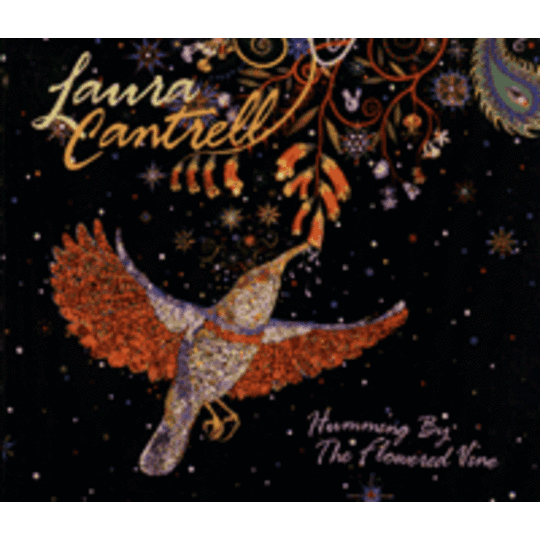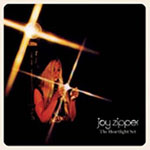Only at the third album stage, Laura Cantrell is oozing the kind of transcendent quality she could only possibly have achieved as the fruit of an utter immersion in the whole expanse of her homeland genre.
Having emigrated to New York from her native Nashville at the age of seventeen to study American literature at Columbia University, Cantrell has emerged in a relatively short space of time from her pastime as a free-form radio DJ and consummate musical historian and job at the equity research department of Bank of America as an alluring hybrid of her new city's style and sophistication and the classic Nashville sentimentality, seemingly ready in all ways to back up what on the back of the scope and maturity of this album will be inevitable comparisons with an artist Cantrell shares more than one similarity with - Lucinda Williams.
Walking into my house a few days ago I had the strange and 100% genuine experience of hearing this album, which was being played by my brother, and veering into a brief but genuine daze where the two artists merged into one, coming out vaguely wondering from where Williams had got her new sound. It is apposite that Cantrell has covered an unreleased Williams song for a track here, providing a perfect chance to later on contrast the two artists, which I will no doubt take up.
Following on from her debut Not the Tremblin’ Kind in 2000, famously hailed by John Peel as possibly his favourite album of all time, and 2002's similarly acclaimed When the Roses Bloom Again, Humming by the Flowered Vine comes in the now familiar country format of adaptations, country standards and tracks of her own to follow on from the resounding success of her originals on the previous albums, but immediately in Emily Spray's gorgeous opener, ‘14th Street’, we find Cantrell, like all true adepts, effortlessly moving to a sound of considerably greater, though no less sensitive, musical and melodic scope. A shimmering paean to New York wonder on the uptown/downtown divide, ‘14th Street’ is a scenic maze of twisting and wistful melody, Cantrell in her element eloquently conveying a girlish wonder while the backing vocals of Mary Lee Kortes create a satisfying and elegant counterpoint. Cantrell seems to have the handy habit of starting albums with such nuggets and Spray's paean here gives us a delightful taste of what's to come.
Jenifer Jackson's ‘What You Said’ starts with a superb whirl of Rob Burger's accordion, soon joined by Kenny Kosek's inspired fiddle in creating a perfect summer feel in which the instrumentals seem to blend vintage and take on a life of their own. Cantrell's interpretation of these "lighter" musical sojourns has been a staple of her charm from the start, and under her guidance, maybe in consequence of the unobtrusive, effortless emotion of her voice, the music seems utterly exposed, and the expression is of a wealth of substance and beauty. ‘Wishful Thinking’, Wynn Stewart's blissful fifties shuffle, is in a similarly thrilling vain, Cantrell affectionately expressing her historian' s fondness for "Californian Country" of the time with a precision execution that has the song absolutely regaling in splendour.
Of her own all-important originals on Flowered Vine, ‘California Rose’ follows on in the tradition of past efforts like ‘Queen of the Coast’ and ‘Mountain Fern’ in being stylistically and emotionally sparkling tributes to forgotten country heroes, Cantrell coating her acute narrative in a traditional and humble country form. Rose Maddox (Maddox Brothers and Rose) is the subject of ‘California Rose’, her sad story caught affectionately and equally poignantly in an upbeat whirl of succinct strings, guitar and pedal steel. Of four originals on Flowered Vine though, the Maddox tribute is the only one representative of Cantrell as a burgeoning and charmingly tentative storyteller.
A progression in melodic complexity and bolder in its sense of venture, ‘Khaki and Corduroy’ is Cantrell's most ambitious effort yet, and is pulled off again with a sense of effortless ease that gives the listener no room to doubt her at all. Atmospherically evoking personal memories of arrival in a new town and impressions of youthful relationships, it is also Cantrell's first step away from the more traditional country instrumentals, with Mark Spencer's emotional piano playing creating a sultry night time feel, and Rob Burger's claviola adding to what is an intricate poignancy. ‘Khaki and Corduroy’ is a particular progressive high point on Flowered Vine and gives the impression Cantrell has been around writing since the advent of the Carter Family. The deeper emotional edge is carried into track nine, a tribute to an old friend of Cantrell's at the end of his time, this time Ted Riechman's piano and Burger's Hammond B3 providing the haunting and poignant form to Cantrell's saddest song yet. The last track, ‘Old Downtown’, is similarly innovative in its broad and rolling, again deeply atmospheric evocation of a place shaped by its turbulent and tragic history. That Cantrell emerges out of this album as an undoubted and original "successor" to the likes of Williams cannot be doubted in the light of these vintage efforts.
So to the Williams comparisons. It is interesting in ‘Letters’, a classic, rolling Lucinda epic which for some reason has never been released, from an artistic point of view to see Cantrell paint the song in completely different colours to what one imagines would Williams. More serene, if you like quaint and picturesque, but no less bubbling with a similar emotion seemingly conveyed in a classical black and white. In ‘Letters’, Cantrell's understated voice comes into its own to create a new, crackling emotional austerity that fills out the classic Williams chorus with a new kind of poignancy. It is maybe Cantrell's intrinsic charm that she plays outwardly like you'd imagine Lucinda Williams to play at home, and in comparison the energies contrast perfectly.
The last song to remark upon, the traditional ‘Poor Ellen Smith’, a truly American murder ballad, is an elegant march through stylistic country history rendered brilliant by the affectionate hand of Cantrell, who arranges as part of the ongoing "folk process", bypassing one out of ten verses in the book. Be it in her own songs or those of the past, in the hands of Cantrell every sinew of her genre seems to be writhing with life, its true magic evoked in a sensual way no history lesson could ever manage. Cantrell opens country music up like a flower, and Humming by the Flowered Vine is a work of formidable and pristine beauty emanating all of its flavour.






















